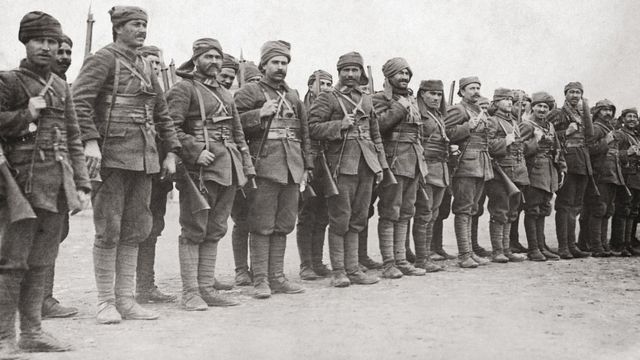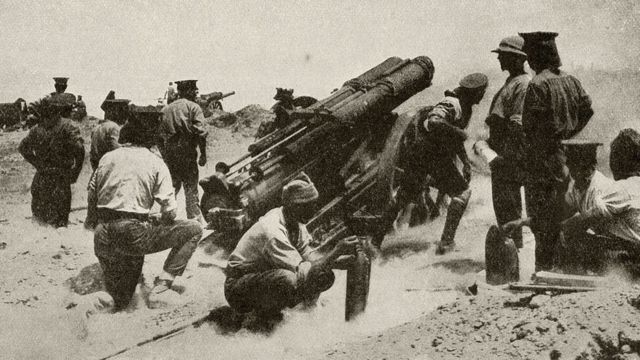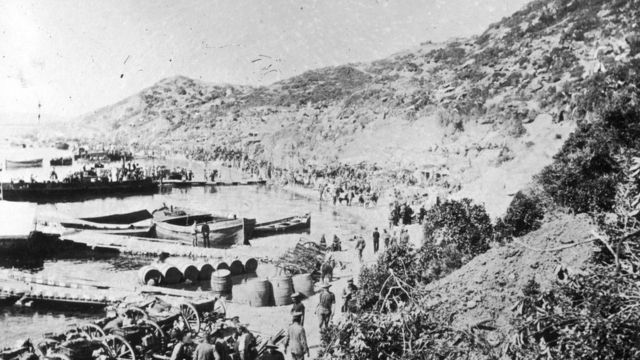Under what conditions was the Battle of Gallipoli fought in 1915, and what was its impact?

As you enter the Dardanelles from the Aegean Sea, a giant monument welcomes you: Martyrs' Monument. It was erected in 1960 in memory of the soldiers who fought and lost their lives in Çanakkale. The historical Gallipoli Peninsula has been flooded with foreign tourists for years, especially Australians and New Zealanders who suffered great losses in the Gallipoli War. However, there has been an increase in the number of local tourists in recent years. Tourist guide Yusuf Kırca says that buses arranged by schools and municipalities from all over Turkey come to Çanakkale. Kırca says, "However, families also want to come with their own means and see these lands." One of the points of most interest to visitors: 57th Regiment Martyrdom... The mausoleums of these soldiers, who first fought against the British Empire and to whom Mustafa Kemal said, "I order you to die, not to attack," are filled with people who want to pray. Especially in recent years, there has been a significant increase in trips to Çanakkale under the leadership of the Ministry of National Education, universities and municipalities. According to the information provided by the Çanakkale Provincial Directorate of Culture and Tourism, the number of tourists coming to the region in the last 10 years increased from 200 thousand to 2 million. This year, the 100th anniversary of the Battle of Gallipoli, the number of visitors is expected to increase even more. 'One of the most important turning points' Historian Mithat Atabay from Çanakkale 18 Mart University says that the Gallipoli Wars can be seen as a rematch for the defeat suffered in the Balkan Wars two years ago: "The Ottoman Empire had to leave the Balkan lands in a total of 24 days. It had only the Gallipoli Peninsula in its hands. It lost all the lands except the area from Bolayır to the Seddülbahir region. This caused a great moral collapse. "Secondly, the Ottoman Empire had always been in decline since 1683. It had never been able to launch an attack. In the Battle of Gallipoli, it expelled the great states of the period from its territory and achieved success in its attacks. This, of course, boosted its morale a lot." Ayhan Aktar, sociologist and historian from Bilgi University, also agrees that the victory in Çanakkale was a great morale booster for the Ottoman Empire. "The Battle of Gallipoli was one of the most important turning points of the First World War for the Ottoman Empire. There is no doubt about this. "In 1914, on the Eastern front, in Sarıkamış, 50 thousand soldiers froze to death in 3 days. The front collapsed completely. A great disaster occurred. Then, the Russians started a counter-attack in January 1915. "Under these conditions, the first victory was won in Çanakkale in April and the second in August. At the end of the year, the British Empire had to withdraw first from the northern and then from the southern front. "All of these were very important for the course of the war. Ottoman commanders gained morale with the successes in Çanakkale. Thanks to this, the Ottoman Empire was able to last until 1918."
'Churchill wanted to collapse the Ottoman Empire' The Battle of Gallipoli consisted of two separate stages, at sea and on land. The Allied Powers navy, led by the British Empire, thought that they could easily capture the Dardanelles by sea, and they aimed to reach Istanbul, the capital of the Ottoman Empire, by this way. By keeping control of the Bosphorus and Dardanelles straits, they hoped to provide safe food supplies and troop reinforcements to their ally, Russia. Ayhan Aktar points out that Çanakkale is in a strategically very important place, considering the conditions of the First World War: "When you look at it from a military history perspective, the Gallipoli Wars were the idea of British Empire Navy Minister Winston Churchill. Churchill wanted to force Çanakkale, occupy Istanbul, and collapse the Ottoman Empire. "It was very important to defend Çanakkale. Because this meant passage to Istanbul. When you crossed the Dardanelles, under the conditions of that day, you would reach Istanbul within six hours." The Ottoman Empire repelled the Allied fleet on March 18, 1915. A month later, on April 25, 1915, British, Australian, New Zealand and French forces landed on the shores of the Gallipoli Peninsula. The clashes continued until the end of the year. The sides suffered heavy losses. 'The front stage of the War of Independence' The Battle of Gallipoli was the last great victory of the Ottoman Empire. Only one other military success followed: the Siege of Kut al-Ammara in April 1916, which resulted in the capture of British soldiers. However, beyond being a victory of the Ottoman army, Çanakkale also holds an important place in the history of modern Turkey. Because the commanders here later fought in the War of Independence and then played the leading role in the establishment of modern Turkey.

Ayhan Aktar points out that a connection has been established between Mustafa Kemal Atatürk's success during the Gallipoli War and the War of Independence: "Mustafa Kemal was a young lieutenant colonel during the Gallipoli Wars. He showed his military genius. When the land wars started on April 25, he led the 57th Infantry Regiment to the front. "He again proved his genius in the August battles. Due to his presence, the Gallipoli Wars are considered as the preparation phase of the War of Independence." However, Aktar is of the opinion that it is wrong that the names of some other commanders who fought in these wars do not find the place they deserve in history: "Cevat Pasha, the 14th Corps Commander in Seddülbahir, or Guido von Usedom, the German admiral who contributed to the mining of the Dardanelles... Why don't we remember these names?" Historian Mithat Atabay also points out another issue, he opposes descriptions such as "Çanakkale is the preface of the new Turkey". "The preface of the Republic of Turkey was written in Sakarya and Dumlupınar. The Gallipoli Wars were a front of the Ottoman Empire," he says. 'The real history of the war must be written' The Gallipoli Wars were of great importance for all the states fighting on the front and went down in the history of the Allied Powers as a "military incompetence". Especially for Australia and New Zealand, the clashes in Çanakkale played an important role in the construction of the national identity of these countries. After World War I, the German, Russian, Austro-Hungarian and Ottoman Empires collapsed. Ayhan Aktar is of the opinion that the history of the Gallipoli War has still not been written properly: "Military archives should be opened. We should be able to sit down, read the material we have carefully and write the real history of the war. "The war in Çanakkale was very bitter. In May, a temporary ceasefire was declared for a few hours because of the smell of corpses. Because there were 80 meters between the trenches and corpses in between. It was not possible to continue the fight because of the smell. "We should be able to talk about the meaninglessness of the war. Turkey's official history is still not at this level. It is still like telling a match... This is very sad."



































